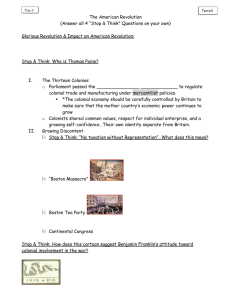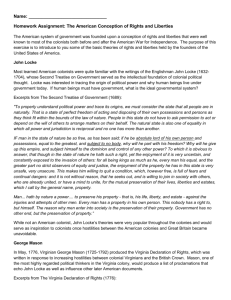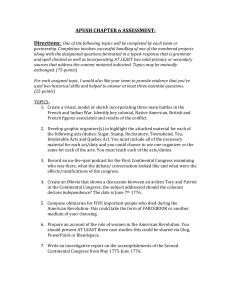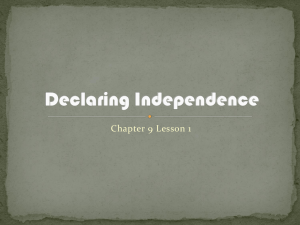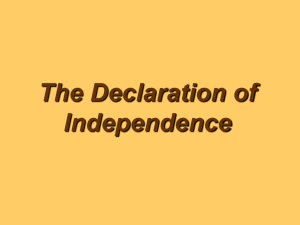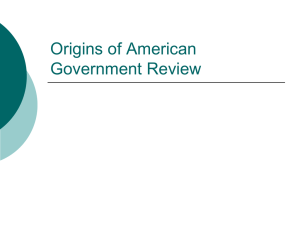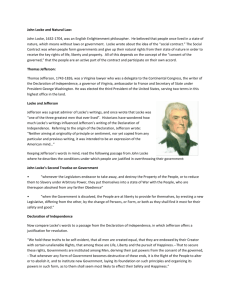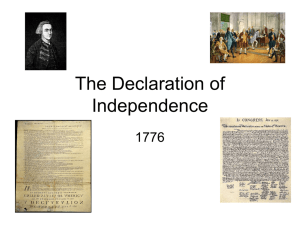CHAPTER 2: CONSTITUTION CONSTITUTION A constitution is a
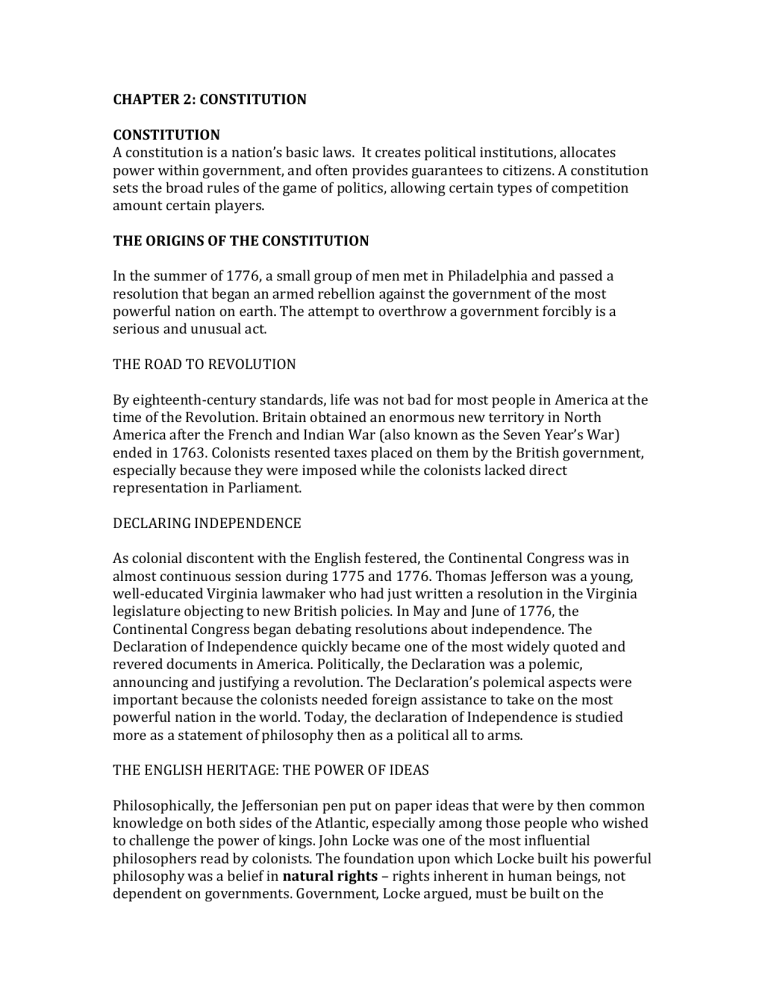
CHAPTER 2: CONSTITUTION
CONSTITUTION
A constitution is a nation’s basic laws. It creates political institutions, allocates power within government, and often provides guarantees to citizens. A constitution sets the broad rules of the game of politics, allowing certain types of competition amount certain players.
THE ORIGINS OF THE CONSTITUTION
In the summer of 1776, a small group of men met in Philadelphia and passed a resolution that began an armed rebellion against the government of the most powerful nation on earth. The attempt to overthrow a government forcibly is a serious and unusual act.
THE ROAD TO REVOLUTION
By eighteenth-century standards, life was not bad for most people in America at the time of the Revolution. Britain obtained an enormous new territory in North
America after the French and Indian War (also known as the Seven Year’s War) ended in 1763. Colonists resented taxes placed on them by the British government, especially because they were imposed while the colonists lacked direct representation in Parliament.
DECLARING INDEPENDENCE
As colonial discontent with the English festered, the Continental Congress was in almost continuous session during 1775 and 1776. Thomas Jefferson was a young, well-educated Virginia lawmaker who had just written a resolution in the Virginia legislature objecting to new British policies. In May and June of 1776, the
Continental Congress began debating resolutions about independence. The
Declaration of Independence quickly became one of the most widely quoted and revered documents in America. Politically, the Declaration was a polemic, announcing and justifying a revolution. The Declaration’s polemical aspects were important because the colonists needed foreign assistance to take on the most powerful nation in the world. Today, the declaration of Independence is studied more as a statement of philosophy then as a political all to arms.
THE ENGLISH HERITAGE: THE POWER OF IDEAS
Philosophically, the Jeffersonian pen put on paper ideas that were by then common knowledge on both sides of the Atlantic, especially among those people who wished to challenge the power of kings. John Locke was one of the most influential philosophers read by colonists. The foundation upon which Locke built his powerful philosophy was a belief in natural rights – rights inherent in human beings, not dependent on governments. Government, Locke argued, must be built on the
consent of the governed; in other words, the people must agree on whom their rulers will be. It should also be a limited government; that is, there must be clear restrictions on what rulers can do. Two limits on government were particularly important to Locke. First, governments must provide standing laws so that people know in advance whether their acts will be acceptable. Second, and Locke was very forceful on this point, “the supreme power cannot take from any man any part of his property without his consent.” In an extreme case, said Locke, people have a right to revolt against a government that no longer has their consent.
JEFFERSON’S HANDIWORK: THE AMERICAN CREED
There are some remarkable parallels between Locke’s thought and Jefferson’s language in the Declaration of Independence. Locke represented only one element of revolutionary thought from which Jefferson borrowed. It was in the American colonies that the powerful ideas of European political thinkers took root and grew into what Seymour Martin Lipset has termed the “first new nation.” No government had ever been based on these principles.
WINNING INDEPENDENCE
The pen may be mightier than the sword, but declaring independence did not win the Revolution -- it merely announced its beginning.
THE “CONSERVATIVE” REVOLUTION
Revolutions such as the 1789 French Revolution, the 1917 Russian Revolution, and the 1978-1979 Iranian Revolution produced great societal change – as well as plenty of bloodshed. American colonists did not feel the need for great social, economic, or political upheavals. They “were not oppressed people; they had no crushing imperial shackles to throw off.”
THE GOVERNMENT THAT FAILED: 1776-1787
The Continental Congress that adopted the Declaration of Independence was only a voluntary association of the states. In 1776, the Congress appointed a committee to draw up a plan for a permanent union of the states. That plan, our first constitution, was the Articles of Confederation.
THE ARTICLES OF CONFEDERATION
The articles established a government dominated by the states. Because unanimous consent of the states was needed to put the Articles into operation, the Articles adopted by Congress in 1777 did not go into effect until 1781, when laggard
Maryland finally ratified them. Even after the Articles were ratified, many logistical and political problems plagued the Congress. The Congress had few powers outside maintaining an army and navy – and little money to do even that. Congress lacked
the power to regulate commerce, which inhibited foreign trade and the development of a strong national economy. In general, the weak and ineffective national government could take little independent action.
CHANGES IN THE STATES
What was happening in the states was more important than what was happening in the Congress. Expanded political participation brought a new middle class to power.
This middle class included farmers who owned small homesteads rather than manorial landholders, and artisans instead of lawyers. The structure of government in the states also became more responsive to the people. Power was concentrated in the legislatures because legislators were considered closer to the voters than governors or judges.s
